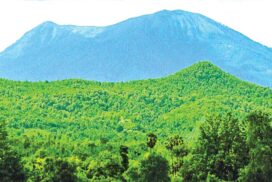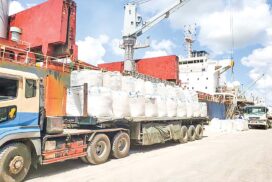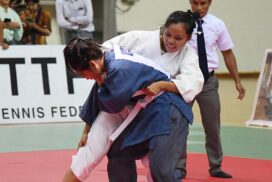By Maung Hlaing
Literary scholars and those from the world of Myanmar literature may know that literary awards have been presented since 1948. With a view to bringing about the development of Myanmar literature, Sarpay Beikman, formerly known as Burma Translation Society (on behalf of the State), started to present the ‘Sarpay Beikman Contemporary Novel Award’ (စာပေဗိမာန်ကာလပေါ်ဝတ္ထုဆု) in 1948.
In the following years, the names of the awards have been changed as ‘Sarpay Beikman Award’ (စာပေဗိမာန်ဆု), ‘Fine Arts Literary Award’ (အနုပညာဆိုင်ရာစာပေဆု) and ‘National Literary Award’ (အမျိုးသာစာပေဆု) in accordance with the situations of the periods we have passed. It was in 2002 that the ‘National Lifetime Award for Literary Achievement (အမျိုးသားစာပေတစ်သက်တာဆု) was successfully introduced. (In this article, I will use the term ‘Lifetime Literary Award’ instead of using ‘National Lifetime Award for Literary Achievement.)
Since then, the award has been presented to one writer or literary scholar whose literary works have contributed enormously to the nation and the people. To date, 31 veteran writers and literary scholars have won the Lifetime Literary Award.
Regarding the Lifetime Literary Award, most of the men of letters have acquaintance with it. However, apart from those who made efforts to implement the scheme, no one knows how the award came into being. The key figure of the scheme was then-Minister for Information Maj-Gen Kyi Aung. Those who chalked out the scheme were U Myo Thant (Maung Hsu Shin), Dr Sithu Thaw Kaung (U Thaw Kaung), Dr Kyaw Sein (ex-Minister for Education), U Tin Kha (Tekkatho Tin Kha), and the author of this article.
their best and earned their rest now. The persons who know the birth of this award are Sayagyi Sithu Dr Thaw Kaung, Tekkatho Tin Kha and the author.
To be objective, the emergence of the Lifetime Literary Award is attributable to Sayagyi U Hla Kyaing (Paragu). Saya Paragu won the South East Asian Writers Award offered by Thailand in 2002.
From 1998 onwards, one of the well-known writers or literary scholars from Myanmar was invited to Thailand to receive the South East Asian Writers Award, popularly known as S.E.A. WRITE AWARD. The award-presentation ceremony is annually held in Bangkok, Thailand. In this connection, may I give you a quick sketch of S.E.A. WRITE AWARD.
The Association of South-East Asian Nations (ASEAN) was officially established on 8 August 1967. At the very outset, Indonesia, Malaysia, Singapore, the Philippines and Thailand were five founder members. Myanmar could not join the Association.
To honour the writers, including poets, novelists, historians and literary researchers from the ASEAN Community, Thailand founded the S.E.A. WRITE AWARD Organizing Committee in 1979. Beginning from 1979, one of the renown writers from each member nation of the ASEAN was offered to receive the S.E.A. WRITE AWARD. In the early years, the awardees represented five countries.
On 23 July 1997, Myanmar became a member of the ASEAN. To honour the membership, a prominent writer from Myanmar was offered to receive the S.E.A. WRITE AWARD in 1998. (The awardee was selected by the judging committee of his/her own country.) The first and foremost person who was selected as the recipient of the award was Sayagyi U Kyi Aye (Sinbyukyun Aung Thein) in 1998.
Later, U Kyaw Aung (Kyaw Aung), Daw Yin Yin (Saw Mon Nyin) and U Tin Maung (Tekkatho Htin Gyi) were also selected to receive the award in three consecutive years of 1999, 2000 and 2001. The awardees were accompanied on their journies to Thailand by me except the trip of Tekkatho Htin Gyi, who was accompanied by U Myint Kywe (Maung Myint Kywe).
In 2002, Sayagyi U Hla Kyaing (Paragu) was selected as a recipient of the S.E.A. WRITE AWARD. It so happened that although Saya Paragu was selected, he failed to leave for Thailand due to the immediate change of the government policy in those days. As Saya Paragu was always cool and calm, he showed no emotion. However, the failure of his departure made Minister Maj-Gen Kyi Aung feel uneasy. He himself personally revered Saya Paragu much.
At the same time, an idea of giving birth to a literary award that would be the equal of the S.E.A. WRITE AWARD came over to him. He tried to reason out how he could pave the way for creating the highest award in the literary field in Myanmar.
One day, Saya Maung Hsu Shin, who was then the adviser to Sarpay Beikman and I were summoned by the Minister. We were told that he felt uneasy about the matter of Saya Paragu and that he wanted to create a literary award of which standard should be higher than that of the existing National Literary Award.
When we came back from the Ministry, we invited Saya U Thaw Kaung, Dr Kyaw Sein and U Tin Kha (Tekkatho Tin Kha) to the meeting. Being the Chief Editor of Sarpay Beikman, I had to attend almost every meeting on literary matters. At the meeting, the scholars took long to detailly discuss the matters on creating a literary award higher than the existing National Literary Award.
At that time, Pakokku U Ohn Pe Manuscript Award had already emerged. Since its emergence, Pakokku U Ohn Pe Lifetime Literary Award has been introduced to the literati. After discussing the matter for two or three hours, they decided to create a lifetime literary award, taking the example of the Pakokku U Ohn Pe Manuscript Award. Because such literary award the Minister wanted should be much higher than U Ohn Pe’s, they added the word ‘National’ to the name of ‘Lifetime Literary Award’.
On the following day, when they submitted the nomenclature ‘National Lifetime Award for Literary Achievement’ to the Minister, the latter was quite satisfied with the name of the award. In brief, because of the efforts made by Maj-Gen Kyi Aung and the scholars, the dream of the Lifetime Literary Award was about to come true.
However, a change took place in the Ministry of Information suddenly. When the scheme was about to be translated into action, Maj-Gen Kyi Aung was transferred to the Ministry of Culture on 13 September 2002. Brig-Gen Kyaw Sunn succeeded him. A few days later, after Brig-Gen Kyaw Sunn had taken the responsibilities of the Ministry, I personally submitted the scheme to him.
Finally, the ministry (the government) gave the green light to the scheme of ‘National Literary Award for Lifetime Achievement and the selection of Saya Paragu as the winner was approved in principle.
Being the secretary of the National Literary Award Scrutinizing Committee, I had sole responsibility for the successful implementation of the award scheme. The final meeting of the committee for (2001) chaired by U Tin Kha (Tekkatho Tin Kha) was held on 1 November 2002. At the meeting, when I announced that the National Literary Award for Lifetime Achievement and the selection of Saya Paragu had been approved, the scholars who attended the meeting gave the announcement a big round of applause.
According to the literary award scrutinizing procedures, although Saya Paragu was named in 2002, his selection was designated as (2001). At the outset, the winner of the National Lifetime Award received K400,000 (Four-hundred thousand kyats), while each winner of the National Literary Award for (2001) earned K200,000 (Two-hundred thousand kyats).
In this way, the first and foremost ‘National Lifetime for Literary Achievement was presented to Saya Paragu at the award-presentation ceremony of National Lifetime Award for Literary Achievement, the National Literary Awards and the Sarpay Beikman Manuscript Awards for 2001, held at the National Theatre on Myoma Kyaung Street, Yangon on 6 December 2002.
From 2001 to 2011, only one writer or literary scholar was awarded. From 2012 to 2014, the award went to three persons. As for 2015, there were two awardees and three persons were awarded for 2016. However, beginning from 2017, the State has presented the Lifetime Literary Award to one veteran writer and one literary scholar. As for the latest year (2019), veteran writer Sayagyi U Arnt Maung (Arnt Maung) and Literary scholar Sayagyi U Nyunt Maung (Maung Maung Nyunt-Mann Tekkatho) became the awardees who received k.5 million each.
The following are the winners of the National Lifetime Award for Literary Achievement from 2001 to 2019:-
1. Sithu U Hla Kyaing (Paragu) (2001)
2. Sithu U Htin Phat (Maung Htin) (2002)
3. Sithu U Htay Maung (Htay Myaning) (2003)
4. Sithu U Lay Myaing (Lay Myaing) (2004)
5. Sithu Daw Yin Yin (Saw Mon Nyin) (2005)
6. Sithu Daw Kyan (Ma kyan) (2006)
7. Sithu U Kyi Aye (Sinbyukyun Aung Thein) (2007)
8. Sithu Dr Kyaw Sein (Dr Kyaw Sein) (2008)
9. Maha Saddhamma Jotika Daja Sithu Dr. Khin Maung Nyunt (2009)
10. Sithu Dr Thaw Kaung (2010)
11. U Win Maung (Min Yu Wai) (2011)
12. Daw Khin Swe Oo (Khin Swe Oo) (2012)
13. U Aung Thin (Aung Thin) (2012)
14. U Tin Maung (Theikpan Hmu Tin) (2012)
15. Dr. U Khin Aye (Maung Khin Min-Danubyu) (2013)
16. Sithu U Tin Hlaing (Lae-dwin-thar Saw Chit) (2013)
17. U Myint Kyi (Tekkatho Myat Soe) (2013)
18. U Win Pe (Mya Zin) (2014)
19. U Khin Maung So (Maung Paw Htun) (2014)
20. U Ko Lay (Ko Lay-Inn Wa Gon Yi) (2014)
21. U Win Mon (Tekkatho Win Mon) (2015)
22. U Tin Kha (Tekkatho Tin Kha) (2015)
23. U Kyauk Sauk Tha Noe (Maung Tha Noe) (2016)
24. U Than Htun (Thein Than Htun) (2016)
25. U Kyaw Win (Nyo Win) (2016)
26. U Myint Lwin (Po Kyawt) (2017)
27. U Tun Yi (Tun Yi-Archaeologist) (2017)
28. U Tin Maung Myint (Tin Maung Myint) (2018)
29. U Tun Aung Chein (Tun Aung Chein) (2018)
30. U Arnt Maung (Arnt Maung) (2019)
31. U Nyunt Maung (Maung Maung Nyunt-Mann Tekkatho) (2019)
The National Lifetime Award for Literary Achievement is an award in recognition of the lifetime outstanding and excellent performance of a man of letters who contributes much to the development of Myanmar literature.
This is nothing but a memoir of the highest literary award in the world of literati in Myanmar.
Ref:
(1) ၂၀၀၁ ခုနှစ်အတွက် အမျိုးသား စာပေတစ်သက်တာဆု၊ အမျိုးသားစာပေဆု ရွေးချယ်ရေး ကော်မတီ၏ အစီရင်ခံစာ။
(2) The Global New Light of Myanmar, 16-12-2020.
(3) The author’s notes.













